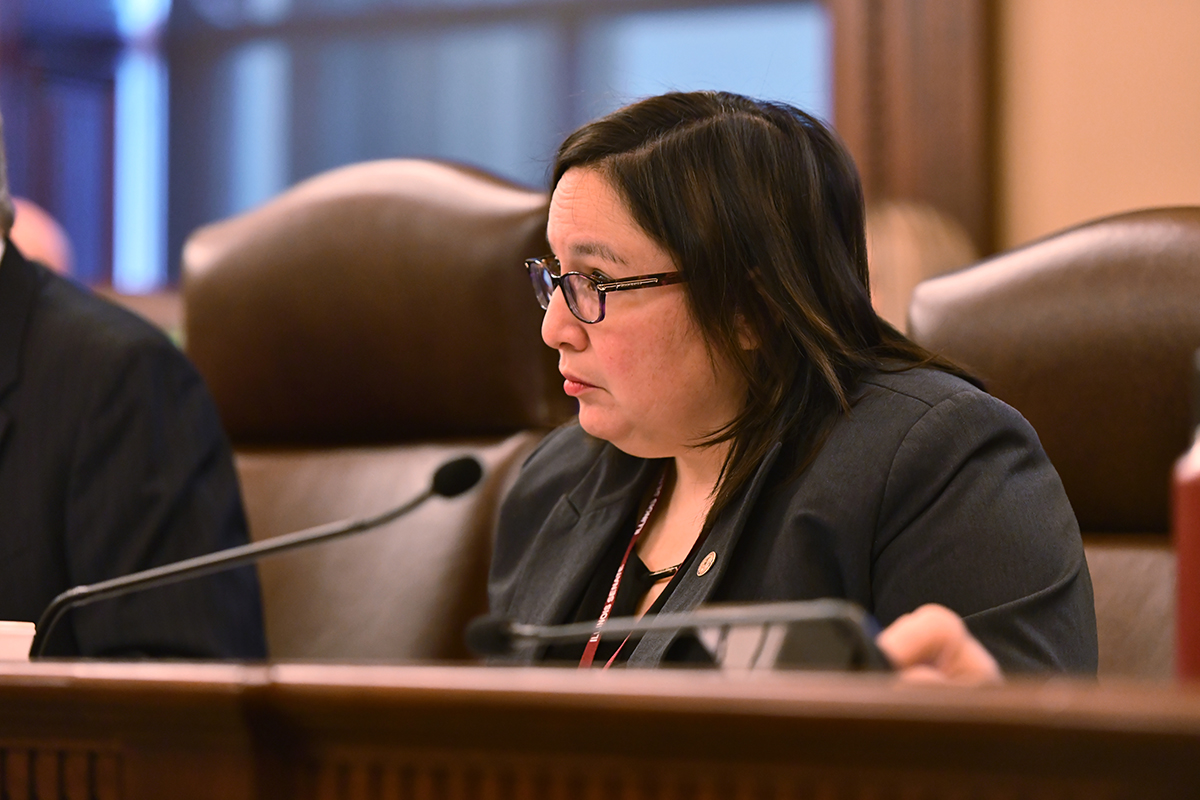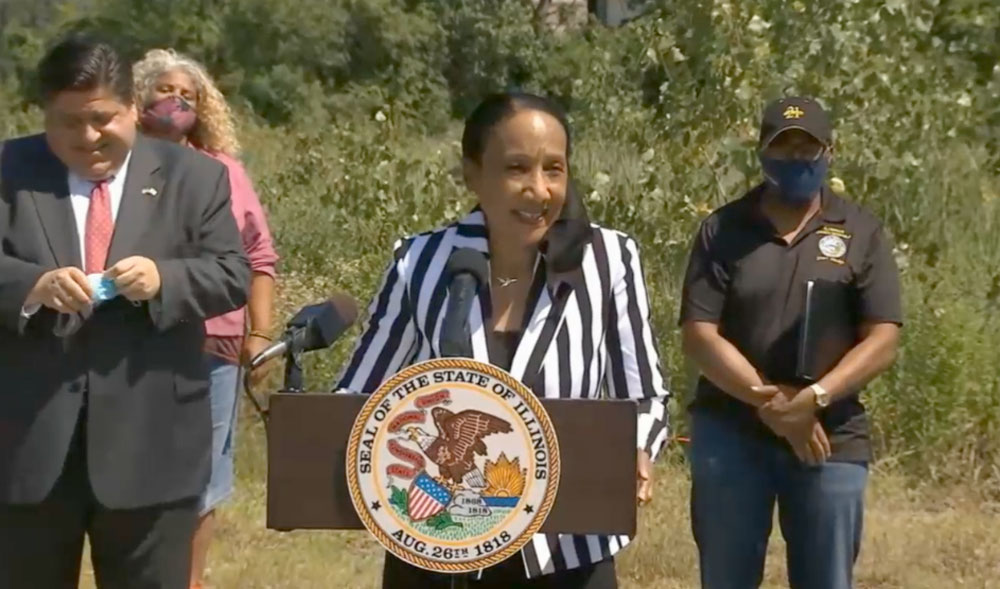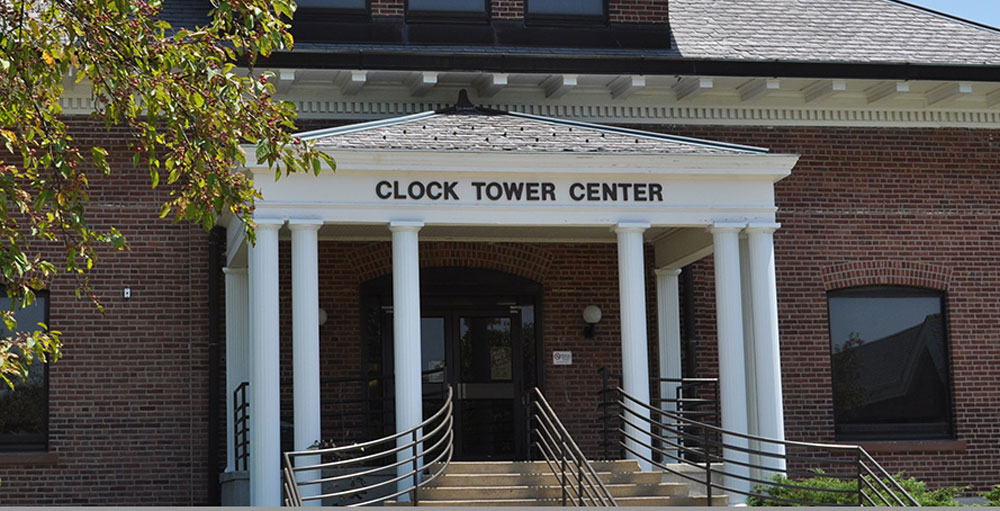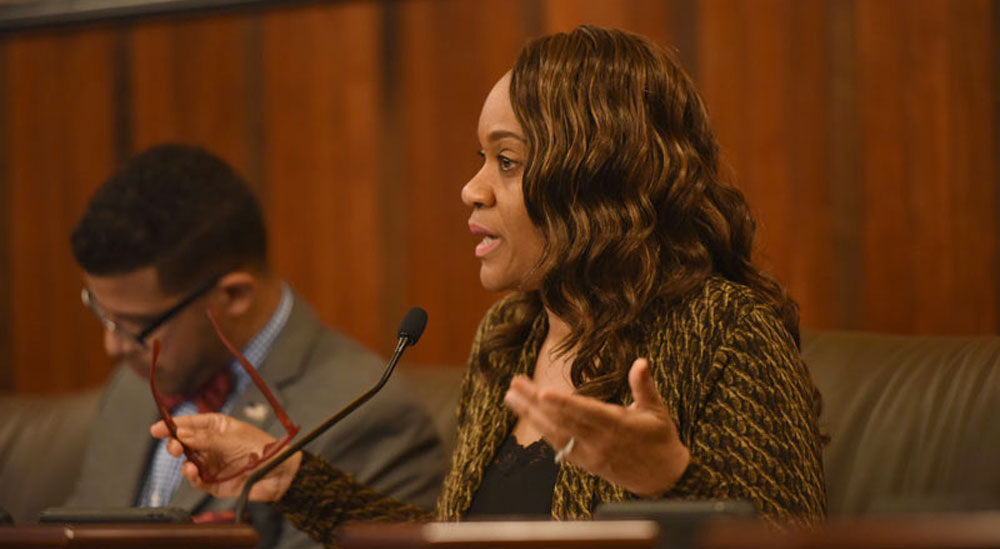- Details
- Category: Senator Cristina Castro News
 ELGIN – A measure supported by State Senator Cristina Castro (D-Elgin) meant to expand protections for essential workers during the COVID-19 pandemic was signed into law by Gov. JB Pritzker on Friday.
ELGIN – A measure supported by State Senator Cristina Castro (D-Elgin) meant to expand protections for essential workers during the COVID-19 pandemic was signed into law by Gov. JB Pritzker on Friday.
“Essential workers literally kept our world up and running during the height of the coronavirus pandemic, so the very least we can do is expand their protections to ensure they stay safe for the duration of this crisis and for any similar future crises,” Castro said. “They perform necessary jobs, often with little thanks, so it’s about time we give back to them.”
The package, Senate Bill 471, was passed by the General Assembly in May and contained three provisions:
- Expanded disability protections for firefighters, paramedics, law enforcement officers and other public workers who contract COVID-19 during the line of duty;
- Enhanced criminal penalties to protect retail workers who are performing duties such as relaying information or enforcing safety guidelines during a state of emergency; and
- Expanded collective bargaining rights for workers at horse racetracks with 10 or more employees.
The law is effective immediately.
- Details
- Category: Senator Patricia Van Pelt News
 CHICAGO – The Illinois State Police’s Division of Forensic Services (DFS) Forensic Sciences Command (FSC) released the DNA Accountability Report for Fiscal Year 2020 last week, and State Senator Patricia Van Pelt (D-Chicago) is highlighting its major improvements to reduce the DNA backlog, while recognizing there is still work to be done.
CHICAGO – The Illinois State Police’s Division of Forensic Services (DFS) Forensic Sciences Command (FSC) released the DNA Accountability Report for Fiscal Year 2020 last week, and State Senator Patricia Van Pelt (D-Chicago) is highlighting its major improvements to reduce the DNA backlog, while recognizing there is still work to be done.
“I am excited about the progress ISP has made,” Van Pelt said. “I hope this trend continues, and I will keep tracking them to make sure they continue to move forward in fulfilling their commitment to giving these families justice.”
During FY20, biology submissions were up by 9% from the previous fiscal year, and ISP completed nearly 16,000 biology assignments within the laboratory system, reducing that backlog by at least 30%.
With the implementation of the new Laboratory Information Management System, ISP now defines “backlog” as an unfinished offender sample, either in-progress or one that hasn't begun.
ISP employed a total of 61 fully trained forensic scientists working on Biology assignments or performing analytical-related activities in June.
In addition to the constant pursuit of federal funding, ISP addressed the biology backlog through outsourcing, the use of overtime and the purchase of additional commodities and equipment, ensuring that more cases were analyzed. In FY20, ISP spent $2.6 million in federal grant funds, which is a 116% increase from the $1.2 million in FY19.
“This report shows a great deal of progress from where efforts were just a few years ago,” Van Pelt said. “But we must keep in mind that just because the kits were processed, doesn’t mean the cases were closed. There are families still awaiting due process in Chicago, and I won’t stop fighting for them until they get it.”
To further reduce the backlog, ISP plans to implement other initiatives including probabilistic genotyping, purchasing additional automated instruments, and streamlining additional procedures.
ISP’s latest developments on the backlog can be tracked here.
- Details
- Category: Senator Rachelle Crowe News
 MARYVILLE – To ensure quality education resources for students in the Metro East, State Senator Rachelle Crowe (D-Glen Carbon) is announcing a state grant for the Mississippi Valley Library Grant to aid in mentoring programs.
MARYVILLE – To ensure quality education resources for students in the Metro East, State Senator Rachelle Crowe (D-Glen Carbon) is announcing a state grant for the Mississippi Valley Library Grant to aid in mentoring programs.
“This grant will provide an opportunity for students needing extra support, especially in the unprecedented times we’re experiencing,” Crowe said. “I commend the state for investing in our youth.”
The Mississippi Valley Library District received a $27,463 grant to support Project Next Generation efforts, a mentoring program for students to develop technological skills, achieve success through project-based learning and gain life skills such as effective communication, goal-setting and conflict resolution.
The Secretary of State awarded $559,358 in 2021 PNG grants to 28 public libraries statewide, based on districts serving culturally diverse, low-income and underserved populations.
Projects were awarded grants from the Illinois State Library using federal Library Services and Technology Act funds provided by the Institute of Museum and Library Services.
- Details
- Category: Senator Patrick Joyce News
 PARK FOREST – In an effort to provide financial and technical support to the dairy industry in Illinois, State Senator Patrick Joyce (D-Park Forest) is urging dairy farmers and businesses apply for grants through the Dairy Business Innovation Alliance (DBIA).
PARK FOREST – In an effort to provide financial and technical support to the dairy industry in Illinois, State Senator Patrick Joyce (D-Park Forest) is urging dairy farmers and businesses apply for grants through the Dairy Business Innovation Alliance (DBIA).
“Every dairy farmer should look at this grant opportunity,” Joyce, a member of the Senate Agriculture Committee said. “These grants are designed to help dairy producers and processors expand, while promoting more entrepreneurial efforts.”
DBIA, a joint effort coordinated by the Center for Dairy Research and the Wisconsin Cheese Makers Association, was designed to support and promote the diversification and addition of value-added products to the Midwest dairy industry.
Goals of the program include increasing on-farm diversification, creating value-added dairy products like specialty cheeses, and expanding export opportunities for farm-scale and processor dairy products.
The grant application period is now open. A total of $220,000 in funds is available, with individual projects eligible for up to $20,000 each. The deadline to complete and return applications is Aug. 14. Selected producers and business owners will be notified Sept. 4.
For questions or additional information, call DBIA at 608-265-1491 or visit https://turbo.cdr.wisc.edu/dairy-business-innovation-alliance/.
- Details
- Category: Senator Ram Villivalam News
 CHICAGO – In response to the recent rise in positive COVID-19 cases, State Senator Ram Villivalam (D-Chicago) is urging residents to take advantage of a new temporary testing site set up at the Bernard Horwich JCC.
CHICAGO – In response to the recent rise in positive COVID-19 cases, State Senator Ram Villivalam (D-Chicago) is urging residents to take advantage of a new temporary testing site set up at the Bernard Horwich JCC.
“Due to the increasing positivity rate in Chicago, we need to continue our strong testing and contact tracing operations to stay ahead of the virus and prevent a big outbreak,” Villivalam said. “Not only is this temporary testing site a way to make it easier than ever to get a fast, easy and free test, but it’s also key to being able to safely reopen our state and economy. Testing and contact tracing are vital to being able to put people back to work without compromising their health or that of their coworkers.”
The temporary testing site is located at 3003 W. Touhy Avenue in Chicago. Testing will be available Monday, Aug. 10 through Sunday, Aug. 16, from 9 a.m. to 5 p.m. each day. Simple nasal swabs will be used, and both drive-thru and walk-up testing are available. Anyone can get tested regardless of whether they exhibit symptoms. The tests are free, and the results will be available within four to seven business days. Residents should bring their insurance card but can still get a test without insurance.
“Part of why this virus is so dangerous is the asymptomatic cases that spread silently through communities,” Villivalam said. “Most asymptomatic cases won’t know they have the virus unless they get tested. This site will allow anyone who may be worried about upcoming travel, visiting family, going to work or caring for children to get a test to make sure they don’t have COVID-19 and hopefully bring them a little peace of mind.”
- Details
- Category: Senator Jacqueline Y. Collins News
 Green Era facility will focus on sustainable food, energy, sanitation
Green Era facility will focus on sustainable food, energy, sanitation
CHICAGO – State Senator Jacqueline Collins (D-Chicago) spoke out in favor of a new $32 million urban farming project announced today to be located in Chicago’s Auburn Gresham neighborhood.
“Neighborhoods like Auburn Gresham are so often caught in a cycle of disinvestment, with each lost opportunity making them less attractive when the next one comes along,” Collins said. “What should be clear by now to all of us is that investment is a self-fulfilling prophecy. If we give communities like this an opportunity to be part of the future, we can make that future a reality.”
Read more: Collins speaks as $32M urban farming site announced in Auburn Gresham
- Details
- Category: Senator Scott Bennett News
 DANVILLE – Danville Area Community College (DACC) is set to receive $2.3 million for infrastructure improvements as part of the state’s Rebuild Illinois capital plan, State Senator Scott Bennett (D-Champaign) announced Thursday.
DANVILLE – Danville Area Community College (DACC) is set to receive $2.3 million for infrastructure improvements as part of the state’s Rebuild Illinois capital plan, State Senator Scott Bennett (D-Champaign) announced Thursday.
“From workforce training to preparing students to advance their higher education, community colleges serve multiple missions,” Bennett said. “During these difficult economic times, I’m pleased to see these funds coming to Danville to support our area community college.”
DACC will use the funds to remodel the Clock Tower Center and for rehabilitation of the Ornamental Horticulture Building, including additions to the greenhouse.
“Investing in vital infrastructure is key to creating good jobs and promoting full economic recovery,” Bennett said. “The state’s investment in DACC will help ensure the college remains strong during these uncertain times.”
In total, the state awarded $103.5 million in grants to 15 community colleges throughout the state through the Rebuild Illinois capital plan. Each community college will also receive an additional $34.5 million in local investments, bringing the total commitment to $138 million.
More Articles …
Page 648 of 769














 © 2026 Illinois Senate Democratic Caucus
© 2026 Illinois Senate Democratic Caucus